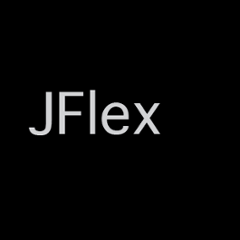JFlex
JFlex is a lexical analyzer generator (also known as scanner generator) for Java.
JFlex takes as input a specification with a set of regular expressions and corresponding actions. It generates Java source of a lexer that reads input, matches the input against the regular expressions in the spec file, and runs the corresponding action if a regular expression matched. Lexers usually are the first front-end step in compilers, matching keywords, comments, operators, etc, and generating an input token stream for parsers.
JFlex lexers are based on deterministic finite automata (DFAs). They are fast, without expensive backtracking.
Usage
For documentation and more information see the JFlex documentation and the wiki.
Usage with Maven
You need Maven 3.5.2 or later, and JDK 8 or later.
-
Place grammar files in
src/main/flex/directory. -
Extend the project POM build section with the
maven-jflex-plugin
<build>
<plugins>
<plugin>
<groupId>de.jflex</groupId>
<artifactId>jflex-maven-plugin</artifactId>
<version>1.8.2</version>
<executions>
<execution>
<goals>
<goal>generate</goal>
</goals>
</execution>
</executions>
</plugin>
</plugins>
</build>
- Voilà: Java code is produced in
target/generated-sources/during thegenerate-sourcesphase (which happens before thecompilephase) and included in the compilation scope.
Usage with ant
You need ant, the binary jflex jar and JDK 8 or later.
- Define ant task
<taskdef classname="jflex.anttask.JFlexTask" name="jflex"
classpath="path-to-jflex.jar"/>
- Use it
<jflex file="src/grammar/parser.flex" destdir="build/generated/"/>
<javac srcdir="build/generated/" destdir="build/classes/"/>
Usage with Bazel
We provide a jflex rule
load("@jflex_rules//jflex:jflex.bzl", "jflex")
jflex(
name = "", # Choose a rule name
srcs = [], # Add input lex specifications
outputs = [], # List expected generated files
)
See the sample simple BUILD file.
Usage in CLI
You need the binary jflex jar and JDK 8 or later.
You can also use JFlex directly from the command line:
jflex/bin/jflex src/grammar/parser.flex
Or:
java -jar jflex-full-1.8.2.jar -d output src/grammar/parser.flex
Other build tools
See Build tool plugins.
Examples
Have a look at the sample project: simple and other examples.
Contributing
JFlex is free software, contributions are welcome. See the Contributing page for instructions.
Source layout
The top level directory of the JFLex git repository contains:
- cup A copy of the CUP runtime
- cup-maven-plugin A simple Maven plugin to generate a parser with CUP.
- docs the Markdown sources for the user manual
- java Java sources [WIP, Bazel]
- javatests Java sources of test [WIP, Bazel]
- jflex JFlex, the scanner/lexer generator for Java
- jflex-maven-plugin the JFlex maven plugin, that helps to integrate JFlex in your project
- jflex-unicode-plugin the JFlex unicode maven plugin, used for compiling JFlex
- testsuite the regression test suite for JFlex,
- third_party third-party librairies used by examples of the Bazel build system
Build from source
Build with Bazel
JFlex can be built with Bazel. Migration to Bazel is still work in progress, concerning the test suite, for instance.
You need Bazel.
bazel build //jflex:jflex_bin
This builds bazel-bin/jflex/jflex_bin, that you can use
bazel-bin/jflex/jflex_bin --info
Or:
bazel run //jflex:jflex_bin -- --info
Build uberjar (aka fatjar aka deploy jar)
bazel build jflex/jflex_bin_deploy.jar
Continuous integration is done with Cirrus CI.
Build with Maven
You need JDK 8 or later.
./mvnw install
This generates jflex/target/jflex-full-1.9.0-SNAPSHOT.jar that you can use, e.g.
java -jar jflex-full-1.9.0-SNAPSHOT.jar --info
Continuous Integration is made with Travis.
